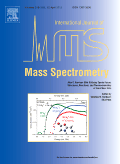
INTERNATIONAL JOURNAL OF MASS SPECTROMETRY
Scope & Guideline
Exploring Innovations in Analytical Chemistry
Introduction
Aims and Scopes
- Fundamental Research in Mass Spectrometry:
This area encompasses the theoretical development and experimental studies that enhance the understanding of mass spectrometric principles, including ionization methods, fragmentation processes, and instrumentation improvements. - Analytical Applications of Mass Spectrometry:
Research that applies mass spectrometry for quantitative and qualitative analysis in fields such as pharmaceuticals, environmental science, and biochemistry, focusing on method development and validation. - Emerging Techniques and Instrumentation:
The journal emphasizes the development of novel mass spectrometric techniques and instruments, such as ion mobility spectrometry, ambient ionization techniques, and miniaturized mass spectrometers. - Interdisciplinary Research:
The journal promotes studies that integrate mass spectrometry with other scientific disciplines, including biology, chemistry, and materials science, showcasing its versatility in addressing complex research questions. - Methodological Advancements and Optimization:
Research focused on improving existing mass spectrometric methods, enhancing sensitivity, resolution, and throughput, as well as novel data analysis techniques, is a core area of the journal.
Trending and Emerging
- Portable and Miniaturized Mass Spectrometry:
Recent publications indicate a growing interest in developing portable mass spectrometers for on-site analysis, particularly in fields such as environmental monitoring, clinical diagnostics, and forensics. - Integration of Mass Spectrometry with Data Science:
The application of machine learning and advanced data analysis techniques to mass spectrometric data is emerging as a significant trend, enhancing the interpretation of complex datasets and improving method optimization. - Multi-Dimensional and Hybrid Mass Spectrometry Techniques:
There is an increasing focus on multi-dimensional approaches that combine mass spectrometry with other separation techniques, such as chromatography and ion mobility spectrometry, to improve resolution and sensitivity. - Biological and Proteomic Applications:
Research centered on the application of mass spectrometry in proteomics, metabolomics, and biomolecular studies is on the rise, reflecting the growing importance of mass spectrometry in understanding biological systems. - Sustainable and Green Chemistry Approaches:
Emerging themes in sustainable mass spectrometry practices are gaining traction, including the development of environmentally friendly ionization methods and the analysis of green chemistry processes.
Declining or Waning
- Traditional Mass Spectrometry Techniques:
There has been a noticeable decrease in publications focused solely on conventional mass spectrometry techniques, as researchers increasingly explore innovative ionization methods and hybrid systems that combine multiple analytical approaches. - Isotope Ratio Studies:
Although still important, studies specifically dedicated to isotope ratio measurements have become less frequent, possibly due to advancements in more precise and versatile techniques that allow for broader applications. - Basic Ion Chemistry:
Research primarily centered on fundamental ion chemistry has seen a decline, as the field shifts towards more applied and interdisciplinary studies that connect mass spectrometry with broader scientific inquiries. - Environmental Monitoring Using Mass Spectrometry:
While environmental applications remain relevant, the frequency of dedicated studies in this area has diminished, likely due to the rise of integrated approaches that combine mass spectrometry with other analytical techniques. - Single-Target Analysis:
There is a decreasing trend in publications focusing on single-target analysis in mass spectrometry, as researchers are moving towards multiplexed and high-throughput methodologies that allow for the simultaneous analysis of multiple analytes.
Similar Journals
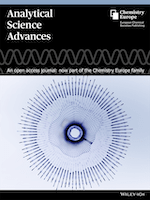
Analytical Science Advances
Empowering Discoveries in the Evolving World of Analytical ScienceAnalytical Science Advances is a dynamic journal published by WILEY, dedicated to the ever-evolving field of analytical chemistry. With an ISSN of 2628-5452, this open-access platform aims to disseminate high-quality research and insightful reviews that push the boundaries of analytical methodologies and instrumentation. Since its inception in 2020, the journal has gained traction, securing a commendable Q2 ranking in 2023 within its category, highlighting its significance in the scientific community. Currently positioned at Rank #68 out of 156 in Scopus' analytical chemistry category, it boasts a 56th percentile ranking, reflecting its contributions to advancing analytical techniques. Researchers, professionals, and students will find this journal an invaluable resource for keeping abreast of the latest developments, emerging technologies, and innovative approaches in analytical science, ensuring the journal's relevancy and influence in shaping future discoveries.
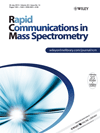
RAPID COMMUNICATIONS IN MASS SPECTROMETRY
Shaping the future of mass spectrometry communication.RAPID COMMUNICATIONS IN MASS SPECTROMETRY is a leading journal published by Wiley, focusing on the rapidly evolving field of mass spectrometry and its applications across various domains, including analytical, organic, and spectroscopy chemistry. With its ISSN 0951-4198 and an E-ISSN of 1097-0231, the journal has firmly established itself as a reputable source of innovative research since its inception in 1987, and is set to continue until 2024. As evidenced by its 2023 Scopus rankings, the journal occupies a solid position in the realms of analytical chemistry (Q3), organic chemistry (Q3), and spectroscopy (Q3), reflecting its impact among a diverse audience of researchers and professionals. Although it is not an open-access publication, the findings shared within its pages are pivotal for advancing knowledge and practical applications in mass spectrometry, making it an essential resource for students and experts aiming to stay abreast of the latest scientific developments.
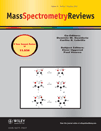
MASS SPECTROMETRY REVIEWS
Unveiling the Science Behind SpectrometryMASS SPECTROMETRY REVIEWS, published by Wiley, is a premier academic journal dedicated to advancing the field of mass spectrometry and its applications across a multitude of scientific disciplines. With an ISSN of 0277-7037 and an E-ISSN of 1098-2787, the journal has established itself as a vital resource within the realms of Analytical Chemistry, Biochemistry, Genetics, Condensed Matter Physics, and Spectroscopy, achieving Q1 status across these categories in 2023. As a testament to its significant contribution to scholarly research, it boasts impressive Scopus rankings, including a rank of #2 out of 76 in Chemistry - Spectroscopy and #4 out of 156 in Chemistry - Analytical Chemistry, placing it in the 97th percentile and above. Emphasizing high-quality, peer-reviewed research, MASS SPECTROMETRY REVIEWS serves as an essential platform for researchers, professionals, and students aiming to stay abreast of cutting-edge developments and methodologies in mass spectrometry. The journal is committed to fostering a deeper understanding of mass spectrometric techniques while also contributing to interdisciplinary advancements, making it a valuable addition to any academic library. Authors seeking to disseminate their work in a journal with a strong reputation and impact in the scientific community will find MASS SPECTROMETRY REVIEWS an ideal venue.
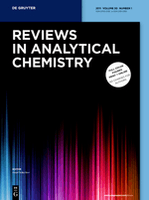
REVIEWS IN ANALYTICAL CHEMISTRY
Pioneering Reviews for Analytical InnovatorsREVIEWS IN ANALYTICAL CHEMISTRY, published by De Gruyter Poland Sp. z o.o., serves as a pivotal resource in the field of analytical chemistry, with a notable impact factor indicative of its scholarly significance. As an Open Access journal since 2020, it ensures widespread dissemination of high-quality research articles, facilitating knowledge sharing among researchers, professionals, and students alike. With its origins tracing back to 1980, the journal has adeptly adapted over the years to encompass emerging trends and innovations within analytical methodologies, maintaining its relevance and authority in the discipline. The journal is ranked in the Q2 category of analytical chemistry in 2023 and holds a commendable Scopus rank of #32 out of 156, reflecting its strong performance and the quality of the studies published. Researchers looking for cutting-edge reviews and insights will find this journal an invaluable platform for advancing their knowledge and research in analytical chemistry.

Molbank
Fostering Innovative Research in Molecular ScienceMolbank is an open-access journal published by MDPI, dedicated to the fields of Biochemistry, Organic Chemistry, and Physical and Theoretical Chemistry. Established in 2002, this journal has served as a vital platform for the dissemination of research findings, where researchers and professionals share original articles focusing on molecular chemistry, synthesis, and related studies. With a commitment to open access, Molbank enables global access to scientific knowledge, fostering collaboration and innovation among scientists. While currently categorized in the fourth quartile for its field rankings, it provides a unique opportunity for emerging scholars to contribute to and engage with the scientific community. The journal is based in Switzerland, operating from its office at ST ALBAN-ANLAGE 66, CH-4052 BASEL, SWITZERLAND, and continues to attract submissions until 2024. Researchers, students, and professionals looking to expand their knowledge and participate in the dialogue of current molecular chemistry can benefit significantly from engaging with the content published in Molbank.
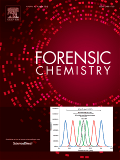
Forensic Chemistry
Pioneering innovative methodologies in forensic chemistry.Forensic Chemistry is a premier journal published by Elsevier, specializing in the interdisciplinary field of forensic science, with a strong emphasis on analytical and materials chemistry, pathology, and law. Established in 2016 and converging to a significant publication trajectory through 2024, the journal has rapidly ascended to an impressive Q1 ranking across multiple categories, demonstrating its impact and commitment to advancing forensic analysis and methodologies. With an impact factor reflecting its relevance—especially notable with a 95th percentile rank in Social Sciences and Law—Forensic Chemistry serves as an essential resource for researchers, legal authorities, and academics seeking to explore the latest developments in forensic techniques and applications. Its rigorous peer-review process and high-quality publications ensure that it remains at the forefront of scientific inquiry in forensic practices. Access to the journal is available without an open access model, further emphasizing its commitment to curated, high-impact scholarship that contributes to both theoretical foundations and practical applications in the forensic field.
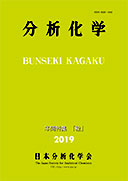
BUNSEKI KAGAKU
Empowering the Next Generation of ChemistsBUNSEKI KAGAKU, published by the Japan Society Analytical Chemistry, is a reputable journal dedicated to the field of analytical chemistry. With an ISSN of 0525-1931, this journal has been a crucial outlet for scholarly communication since its inception in 1952, converging its publication years from 1954 to 1957 and from 1959 to 2024. Although it holds a Q4 category ranking in the most recent 2023 quartiles of analytical chemistry and ranks 153/156 in Scopus, it continues to serve as a platform for quality research, fostering advancements in the field. BUNSEKI KAGAKU is based in Tokyo, Japan, and emphasizes the critical importance of analytical techniques in scientific inquiry. With a commitment to professionalism and rigor, the journal provides a vital resource for researchers, students, and professionals seeking to explore innovative methodologies and contribute to the ongoing dialogue in analytical chemistry.

LCGC North America
Empowering Innovation in Chromatography and BeyondLCGC North America is a pivotal resource in the field of Analytical Chemistry, published by MJH Life Sciences. Since its inception in 1999, the journal has strived to bridge the gap between scientific research and practical applications, catering to a diverse audience that includes researchers, professionals, and students interested in chromatography and related analytical practices. Although currently categorized in the Q4 quartile of Analytical Chemistry, with a Scopus rank of #137 out of 156, LCGC North America is dedicated to delivering insightful articles that foster discussion and innovation within the analytical chemistry community. With a commitment to quality content, the journal covers a broad spectrum of topics, ensuring that readers remain informed about the latest developments and trends in the field. Despite its non-open access model, readers can access its valuable resources through institutional subscriptions and various library networks, making it a vital asset for those engaged in cutting-edge research and practice. Located in Cranbury, NJ, United States, LCGC North America continues to contribute significantly to the advancement of analytical methodologies and technologies.

JOURNAL OF ANALYTICAL CHEMISTRY
Innovating Insights in Analytical ChemistryJOURNAL OF ANALYTICAL CHEMISTRY, published by PLEIADES PUBLISHING INC, stands as a pivotal resource in the field of analytical chemistry, offering an innovative platform for researchers, professionals, and students to advance their knowledge and contribute to the discourse within the discipline. With an ISSN of 1061-9348 and an E-ISSN of 1608-3199, this journal features a focused exploration of analytical methodologies, instrumentation developments, and applications across various domains, contributing to practical and theoretical advancements in the field. Currently ranked in the Q3 category in Analytical Chemistry with a Scopus rank of #111 out of 156, it provides critical insights and innovation strategies for professionals aiming to enhance their analytical capabilities. Access to the journal is through standard subscription models, and it covers an extensive range of topics pertinent to the discipline from 1996 to 2024. Engage with the JOURNAL OF ANALYTICAL CHEMISTRY to be part of a vibrant research community dedicated to push the boundaries of analytical practices.
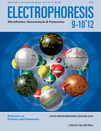
ELECTROPHORESIS
Pioneering Research in Biochemical TechniquesELECTROPHORESIS, published by Wiley, stands as a premier journal dedicated to advancing the field of analytical chemistry, biochemistry, and clinical biochemistry. With an ISSN of 0173-0835 and an E-ISSN of 1522-2683, this journal has been a vital resource since its inception in 1980 and is poised to continue its journey through to 2024. Operating out of Germany, it holds a significant standing in the academic community, featuring in the Q2 category for Analytical Chemistry and in the Q3 tier for both Biochemistry and Clinical Biochemistry as of 2023. The journal ranks impressively within Scopus, occupying the 43rd position out of 156 in Analytical Chemistry and the 44th spot out of 117 in Clinical Biochemistry, ensuring its relevance and impact in these disciplines. Although it does not currently offer open access, ELECTROPHORESIS remains an essential publication for researchers, professionals, and students seeking cutting-edge insights and developments that influence the methodologies and technologies underpinning electrophoretic techniques.